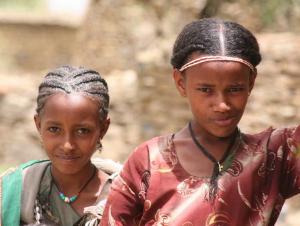Naming, Masculinity and Retaliation in Amhara Society, North West Ethiopia
Mezgebu Mengistie
 Amhara parents have unique traditions for socializing boys and girls according to their expected roles. Naming is one of these traditions, used to guide boys toward manhood and girls toward womanhood.
Amhara parents have unique traditions for socializing boys and girls according to their expected roles. Naming is one of these traditions, used to guide boys toward manhood and girls toward womanhood.
Masculine names often reflect events that occurred before or after a boy's birth. There's a distinction in masculine names based on whether the family has sought revenge or avenged their enemies.
Names given to boys by families who have suffered a wrong are intended to inspire their sons to take retaliatory vengeance when they grow up. In contrast, names from avenging families carry a heroic meaning, demanding that their sons defend the honor achieved through past feuds. Therefore, names in the former category encourage sons to seek vengeance in response to their family's request, while names in the latter category compel sons to maintain their own honor and the already established honor of their families by retaliating for past hurts and murders inflicted upon them and their close relatives.
Some of such masculine names that are commonly given to boys in the victims/wronged family of Amhara communities are described as follows:
| Amharic |
English |
Amharic |
English |
|
| ደምመላሽ: |
“Let make blood retaliation!” |
ዳምጠው |
“Crush him” |
|
| ጸጥአርጋቸው |
“Make them silent!” |
ደምስ |
“Destroy!” |
|
| አንድአርጋቸው |
“Let make them one!” |
ደምሳቸው |
“Annihilate them!” |
|
| ጋሻሁነኝ |
Let be the bulwark of mine!” |
በለው |
”Kick (kill) him!” |
|
| መክት |
“Let defend the family from revenges!” |
በላቸው |
“Kick (kill) them!” |
|
| መከታ |
“Defender, protector!” |
ያዛቸው |
“Let caught them!” |
|
| አድማው |
“Bleed him!” |
ጥላሁን |
“Be umbrella” |
|
| አድማቸው:“ |
“Bleed them!” |
አሳምነው |
“Let convince him!” |
|
| መኩሪያሁነኝ |
“Be my proud!” |
አሸብር |
“Let terrorize!” |
|
| ዳምጣቸው፡ |
“Crush them” |
|||
These names are assigned to boys born after incidents of homicide, property damage, or injuries to their father or other close relatives by enemies. Such names serve as symbols, representing the expectation that these boys will avenge their relatives as they grow up. Failure to live up to the meaning of their name can expose them to ridicule, insults, and sarcasm from the community, further pressuring them into retaliations to escape social sanctions.
In contrast to the names above, the following names are given to boys to defend the honor their family gained through successful retaliatory vengeance:
| Amharic |
English |
Amharic |
English |
| ማንደፍሮህ |
“Who can challenge you?” |
ኩራባቸው |
“Be proud before them!” |
| ሽፈራው |
“Thousands feared him” |
ተፈራ |
“Was feared” |
| ማንያዝዘዋል |
“Who will dare to command him?” |
ተፈሪ |
“Feared” |
| በሃይሉ |
“In his force” |
መከተ |
“Was defended” |
| አሸናፊ |
“The winner” |
Boys assigned these names are expected to protect the honors and privileges gained by their close relatives. If they fail, they may face social exclusion, including ridicule and sarcasm from community members, which often prompts them to act.
The proverb "ያንጠለጠለ ሁሉ ወንድ አይባልም!" (All those who are born with a male organ are not worth to be called man) further embodies the Amhara concept of masculinity. It suggests that being male is not merely a biological fact but a "quality of men" achieved through facing challenges, enduring hardships, and seeking vengeance for murders and hurts (such as insults, wounds, injustices, crimes, damages, harms, and injuries). In this context, manhood is not an ascribed status but an earned one.
Ultimately, both naming conventions and proverbs are powerful tools in Amhara society for perpetuating retaliatory feuds.
Mezgebu Mengistie
Lecturer and Researcher, Department of Sociology and Social Anthropology
Addis Ababa University, Ethiopia
E: (opens in a new window)mezgie2002@gmail.com